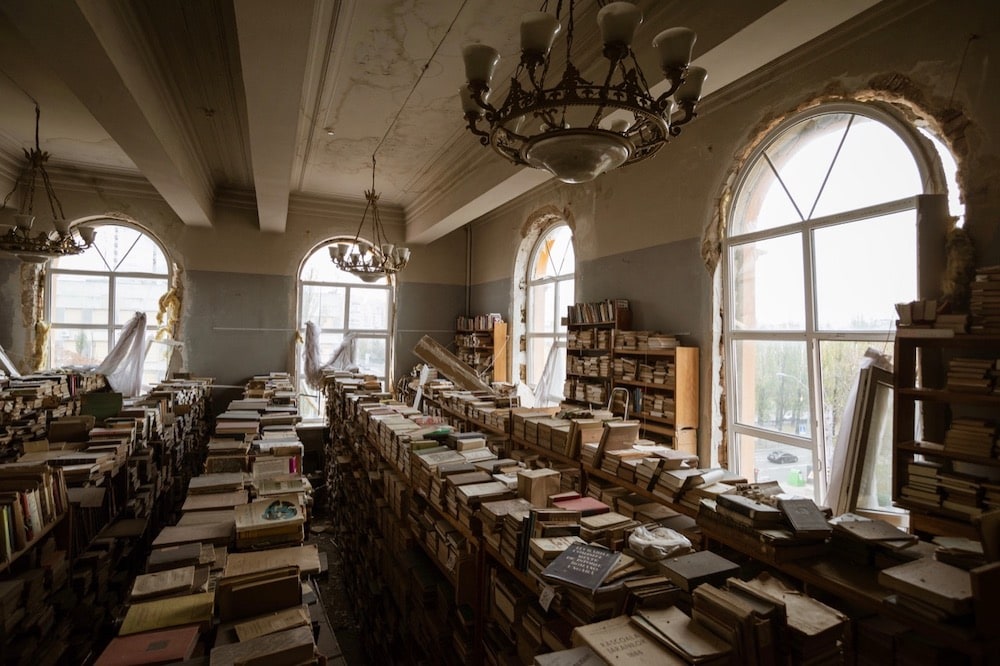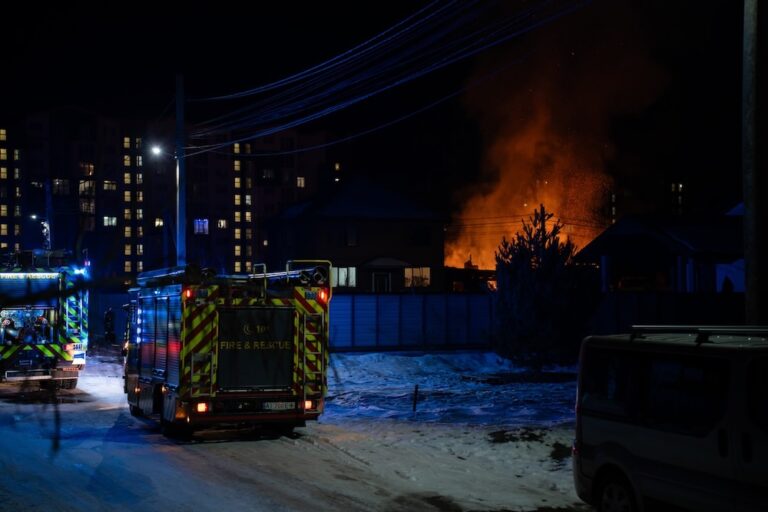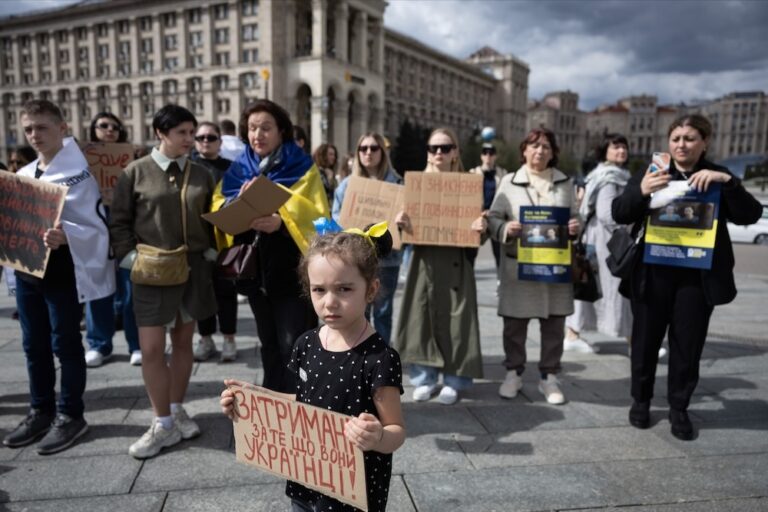"Culture - past, present, and future - is on the front lines of the brutal war on Ukraine and cultural erasure is a central tactic of Russia’s campaign of aggression and violence in Ukraine, which has gone on for over eight years."
This is an excerpt of a report originally published on pen.org on 2 December 2022.
The report documents pervasive attacks on cultural infrastructure and repressive tactics to undermine language, books, writers, artists
The report, Ukrainian Culture Under Attack: Erasure of Ukrainian Culture in Russia’s War Against Ukraine, was released in Kyiv today jointly with a visiting delegation of prominent American writers — Barbara Demick, Dave Eggers, and Peter Godwin – who came to stand in solidarity with Ukrainian writers and bear witness to the war’s impact.Leaders of PEN America and PEN Ukraine, joined by members of the delegation, held a press conference at the Ukraine Crisis Media Center to discuss the findings.The release of the report comes after the discovery of the body of Ukrainian writer Volodymyr Vakulenko who had not been seen since he was abducted by Russian forces last March from his home in Kapytolivka, a village near Izium. According to Vakulenko’s ex-wife, DNA analysis confirmed that the body found in the Izium forest mass grave belongs to Volodymyr, PEN Ukraine reports.The new report on cultural erasure details how Russian forces have destroyed or damaged not only national cultural buildings, including historic and religious sites, but also many smaller community sanctuaries in towns and villages where people meet to enjoy art, music, writing, and other forms of culture. The Ukrainian Ministry of Culture and Information Policy said on November 17 that 529 cultural heritage and cultural institutions have been damaged or destroyed since the Feb. 24, 2022 invasion.
The report also found that the Russian Federation has undertaken a deliberate campaign of repression and human rights abuses against writers and other creative voices in Crimea, Luhansk, and Donetsk since its illegal occupation began in 2014. These tactics form part of repeated and persistent efforts to suppress Ukrainian and Crimean Tatar culture and include efforts to quash the use of these languages in schools, the destruction of books, and limiting access to or banning independent and Ukrainian- and Crimean Tatar-language media.
Tetyana Teren, executive director of PEN Ukraine said, “Destruction of Ukrainian culture and identity has been one of Russia’s aims both during the occupation of Crimea and parts of Eastern Ukraine in 2014 and during the full-scale invasion in February 2022. It is crucial to understand that imperialistic Russian attempts to destroy Ukrainian identity and culture did not start nine months or nine years ago but have been going on for centuries. This report demonstrates the magnitude of Ukrainian cultural losses since 24 February 2022 and confirms that, in many cases, cultural objects have been the direct aim of Russian attacks. These atrocities must be documented and investigated within the framework of national and international accountability mechanisms, and all perpetrators responsible for the deaths of Ukrainian cultural figures and the loss of our cultural heritage punished.”
The Ukrainian government, civil society, and Ukraine’s international partners are working to protect and preserve culture, and cultural heritage. However, the report notes that traditional approaches to cultural preservation in wartime, focused mostly on the physical manifestations of culture, will not be sufficient to ensure the survival and flourishing of Ukrainian culture and its writers and artists during and after the war. It urges policy-makers to take a more expansive view of culture, paying greater attention to the survival and well-being of those who create, inspire, and develop culture in all of its varied forms and those who curate, care for, and preserve culture: museum workers, curators, archivists, librarians, and others. Governments should be providing resources for protection and sustenance of writers, both those who are internally displaced as well as refugees; funding efforts and initiatives to create opportunities for them to write and create, such as residencies, and ensuring that adequate funding is allocated to the reconstruction and restoration of cultural heritage when the war is over.
PEN America CEO Suzanne Nossel stated: “Cultural obliteration is both a motive and a tactic of Russia’s war on Ukraine. The international community must consider not just cultural preservation, but also cultural fortification, continuity, and resilience as key elements of Ukraine’s defense and its ability to endure and thrive as an independent nation. The question of whether Ukraine can survive and reemerge as a vibrant unified country will depend significantly on investments in the culture that underpins it, including the safety and livelihoods of those who create, inspire, and develop culture in all of its varied forms.”
The report documents the distinct tactics Russia has used in its attempts to target Ukrainian culture, including:
- Dozens of Russian attacks that have damaged local “houses of culture” including music venues, lecture halls, and stadiums that function as important community and cultural spaces, sometimes the only venue of their kind in rural settings. One example is the bombing of the Palace of Culture in Lozova, near Kharkiv. Executive Director Victor Haraschuk said: “Everyone knew the Palace of Culture. This is the soul of our city.”
- Occupying forces have ordered the removal of Ukrainian textbooks and other books from school libraries. In September 2022, a Ukrainian journalist published photographs of decrees titled “On the Removal of Literature,” signed by occupying authorities ordering the removal of hundreds of textbooks and books of Ukrainian literature.
- Russian occupying forces have threatened, detained, and disappeared museum and other cultural workers. In Melitopol, which came under Russian occupation on March 1, Russian forces burst into the home of Leila Ibrahimova, director of the Melitopol Museum of Local History and kidnapped her. They released her several hours later after she refused to show the soldiers where the museum’s ancient gold collections were being stored. The museum’s curator Halyna Kucher refused to cooperate as well, and was abducted from her home on April 30; her whereabouts remain unknown.
- The Ukrainian government has documented damage and destruction to at least 49 libraries and archives. Oksana Boiarynova, a member of the Ukrainian Library Association Board, reported in August that 2,475 libraries, out of about 15,000 across the country, are currently closed due to damage, funding, or staff being forced to leave their jobs and homes due to the conflict. She said that 21 libraries have lost their entire collections.
- Russian soldiers have seized and destroyed Ukrainian literature and Ukrainian-language books from public libraries in the occupied territories of Luhansk, Donetsk, Chernihiv, and Sumy regions, according to the Ministry of Defense of Ukraine.
- The conflict claimed the lives of writers, artists, and cultural workers. PEN Ukraine’s webpage documents 31 artists, writers, and other cultural creators who have been killed under “People of Culture Taken Away by the War.”
While it is not always possible to determine if the bombings of cultural sites are deliberate or the result of Russia’s indiscriminate bombing of civilian areas, the independent research organization Bellingcat has stated that “the sheer number of cultural sites damaged or under threat indicates that it is highly unlikely they are being excluded from Russia’s bombardment.” The clear efforts at cultural erasure in areas Russia has occupied and its ongoing targeting of writers, artists, and cultural defenders make clear the deliberate nature of the attacks on Ukrainian culture.
Despite the pervasive attacks, Ukrainian writers, poets, artists, and cultural defenders demonstrate remarkable resilience and resistance in the face of this brutal conflict and attack against their culture. The report shows how many draw strength from their connections to Ukrainian culture and are actively seeking new ways to produce and promote culture. Writers are writing wartime diaries. They are giving literary readings in bookstores against the backdrop of air-raid sirens, and concerts in metro stations doubling as bomb shelters.
**
PEN Ukraine is a leading voice for free expression, human rights, democracy, and a home for Ukraine’s literary community. Read more.
PEN America stands at the intersection of literature and human rights to protect open expression in the United States and worldwide. We champion the freedom to write, recognizing the power of the word to transform the world. Our mission is to unite writers and their allies to celebrate creative expression and defend the liberties that make it possible. Learn more at pen.org
PEN America’s Artists at Risk Connection has established a fund to support visual artists in Ukraine whose basic needs and artistic practice have been disrupted.



